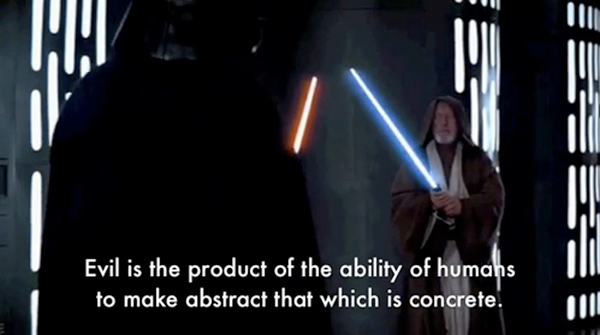“There is no Chaos; there is Harmony” – Jedi Code
The underlying message of the mantra “There is no Chaos; there is Harmony” is perception. At times everything around us seems in utter chaos. Thoughts and emotions can run amok and cause us to act in ways that we later regret. The way you respond to things out of your control remains within the power of your control.
“We can control our lives by controlling our perceptions.” –
For a recovering alcoholic, the progression of the disease is like being caught in a whirlwind. It is nothing less than pure chaos, a type of hell or nightmare in which we have no control. The only way out ironically is to accept, admit and surrender, there lies the keys to freedom.
Whatever has been said about Darth Vader it can never be said that he was an agent of Chaos. Darth Vader was to the extreme a controller, he wanted to rule the universe and control the Force. In the end he was little more than a slave to Darth Sidious who was chaos himself.
Sheev Palpatine was a megalomaniac, a narcissist with a colossal ego who thrived on chaos, deception and manipulation to control others. Not that different to a functioning alcoholic, Palpatine was drunk on the power of the Dark Side. Control was maintained by perpetuating disharmony through fear.
Chaos, like Palpatine, was my master and I know her well. She was a cruel mistress but she promised me joy, power, confidence and popularity. She made me feel like a king and allowed me to feel alive and free. Once I was hooked she made me a slave and I could not live without her. She made me lie, steal, cheat, fight and disgrace myself over and over again. She challenged me to leave and then would punish me severely when I returned. I rode on this merry-go round from hell for over 20 years and tried many times to get off but could not until she took me to a very dark place and that’s where I found my way out. The grace of a a higher power.
You can choose Chaos or Harmony. That is in your control.
“Your perspective is always limited by how much you know. Expand your knowledge and you will transform your mind.” –
We know that the world can seem chaotic yet viewed from a distance the planet appears in order, calm and peaceful, in harmony. Even if your world seems to be falling apart there is more working in the world than not. The water, electricity and telecommunications systems are still running. There is still food on supermarket shelves. Harmony resides behind the chaos.
Whether in full glory or behind a mask of clouds, the sun will rise in the morning. Harmony cannot exist without chaos no more than day can exist without night. The sun never really rises, and it never sets, that is only a perception. Yet we do not feel the world turning beneath our feet.
“Our beliefs control our bodies, our minds, and thus our lives…” –
When we center ourselves and look at a situation outside of the lens of our own reactivity it often looks very different. To paraphrase Epictetus, “it is not the thing that harms us but our perception of it”. Chaos exists within you but so does harmony.
By grounding yourself you can sort through the chaos and find inner harmony. The world may fall apart but that does not mean that it should also cause your mind to do the same. You have a choice how to perceive a thing and how to respond to it.
Buddha stated that in fact there is nothing. Nothing we perceive is as it appears. Everything is an illusion. Yoda tried to explain this to Luke Skywalker and demonstrated that power when he lifted the X-Wing out of the swamp on Dagobah with his mind.
“What quantum physics teaches us is that everything we thought was physical is not physical.” –
Quantum physics demonstrates how little we understand matter and energy. All matter is in fact packets of energy and essentially comprised of nothing. This sub-particle concept is incredibly mind-boggling but illuminating. Consider that an electron can exist in two different points in the Universe, at the same time. It can be here and there at the same time. Chaos and harmony are in balance at the cosmic and at the particle level.
Our goal is to live in harmony with others, the environment and ourselves. By achieving harmony with the inner and outer environment we come to be in harmony with our higher self.
Our very cells respond to our thoughts. A mind that resides in chaos and disharmony affects the body at the physiological and DNA level. The community, nature and health of the individual are affected. When we are in a balanced a state of harmony allows for the body, community and nature to heal itself and function.
“human beings have a great capacity for sticking to false beliefs with great passion and tenacity,” –
Giving up false beliefs, becoming honest and pouring passion and tenacity into recovery is what brings contended sobriety to the suffering alcoholic. The formula works wherever disharmony exists.
The world is in the current mess because humanity is in disharmony with itself and with nature. Our species has forgotten that we are a part of nature and not separated from it. We share a common fate because all is ultimately connected. Once we find that connection with nature and live in harmony with it, the balance can be restored and the world can recover.
When Yoda said “we are luminous beings, not this crude matter” I believe that George Lucas was alluding to this convergence between science and the spiritual. The interconnectedness of all things defines the Force. Harmony cannot exist without chaos. The Force binds everything together and pervades everything like the Tao. Where chaos and harmony meet and balance, we find Infinite Love. Is Life, the cosmos, not both after all? It is a perfect union of chaos and harmony.
“Nature is based on harmony. So it says if we want to survive and become more like nature, then we actually have to understand that it’s cooperation versus competition.” –
To ground yourself be mindful of your thoughts and emotions by regularly checking in on them. Ask yourself, “What am I feeling right now”. Observe, impartially, the emotions that stir within you. Explore them with a curious mind without becoming attached to them as if observing them from a distance.
Observe your thoughts in the same way; ask “What am I thinking right now?” Dissect your thoughts without judgement resisting the urge to attach to them. You only need to decide if they are reasoned and serve you. Let go what doesn’t.
Anytime you feel yourself disconnected stop for a moment. Just breathe focusing on the air entering and leaving your lungs. Close your eyes if you wish. Open them and look around. Feel the earth beneath your feet. Open your senses to the world. Seek out nature whenever you can. The natural world will centre you and restore harmony. Be at peace, calm, passive in the world.
Watch the full episode with Dr. Bruce Lipton for FREE: https://londonreal.tv/dr-bruce-lipton…







